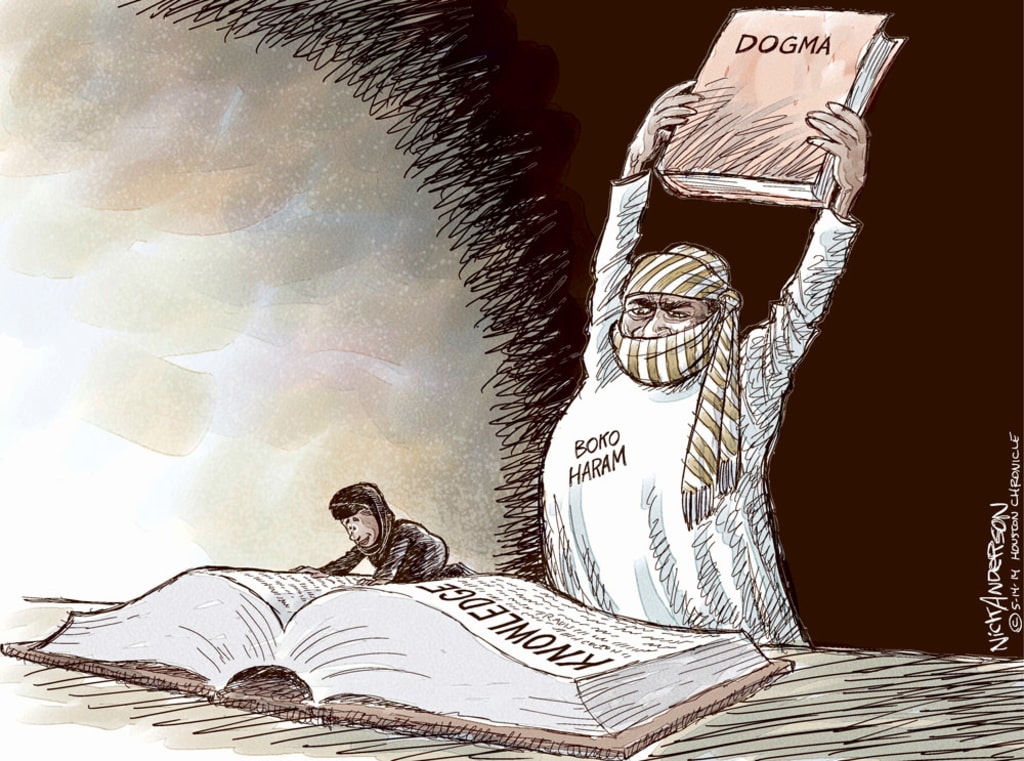Knowledge: Is It Really Power?
Pictures are worth 1,000 words.

Political cartoons are in and of themselves meant to comment through imagery and text on contemporary social issues, evoking a strong emotional opinion in the viewer. In one of Nick Anderson’s political cartoons, a small burqa-clad woman kneels on an open book three times as big as her with the word “Knowledge” inscribed on one of its pages. A large man wearing a hijab towers over her with the words “Boko Haram” written on his chest and he is about to crush the woman with a book captioned “Dogma.” The message conveyed by the cartoon is clear: the education of women in countries taken over by the terroristic Nigerian sect Boko Haram is forbidden by the male overlords who enforce Sharia, or Islamic, Law upon the people. To raise awareness in young men and women about how Boko Haram forbids the education of women, the cartoon uses specific design elements that are emotionally, yet logically, inducing.
Two symbolic focal points of Anderson’s cartoon which are emotionally engaging to young men and women are the small Islamic woman and the tall man who represents Boko Haram. The woman is hunched over the book of knowledge with her back turned toward the large man who is about to crush her with his book. Her body is extremely small and petite in contrast to the Boko Haram man who is about five times as big as her, and she appears oblivious to her surroundings as she studies the book of knowledge intensely. Behind her looms a frighteningly tall and intimidating man about to crush her underneath his book of dogma. His arms are relatively small compared to his large torso, but his masculine hands firmly grasp the book as it is raised above his head. The contrasts in body size represent how Nigerian women may feel when they are compared to their male authorities who have all the opportunities that can only be dreamt about, and the image of the terrifying man about to crush the tiny woman stimulates emotional responses in the viewers.
Another element of the cartoon which induces an emotional reaction is how the man hovering behind the woman is about to crush her with his book of dogma, which is not nearly as big as the book of knowledge. The book of knowledge is opened to its middle section, emphasizing the great quantity of pages on both sides. The tiny words scribbled on the open pages are illegible, but the woman kneeling on the book appears to study them with an intense gaze. The book of dogma looks relatively petty compared to the book of knowledge, but it is still large enough to crush the small woman. The contrastingly few quantities of pages it contains is clearly shown; nevertheless, the most intimidating quality of the book of dogma is that it is about to become the murder weapon of a helpless woman. The thickness of the book of knowledge seems to demonstrate that there is more information to be found in the world than there are set rules for people to follow, yet Anderson’s representations display the harsh reality that unfortunate women in Nigeria are forced to face on a day-to-day basis, all because they wish to harness the power of knowledge. Those who are young men and women are beginning to understand how Anderson’s depictions are meant to raise awareness for the Boko Haram-oppressed women.
Anderson’s cartoon uses design elements that are also logically appealing to viewers. The only source of promising light radiates from the side of the cartoon that the small woman and the book of knowledge are on, while there is a darkness that surrounds the large man and the book of dogma; additionally, the place where the light and dark meet is separated by jagged, black lines which make the darkness look like it is trying to overcome the light. It appears that the light and dark are battling to become the background of the picture, but the jagged black lines that reach from the darkness seem to be winning. The hopeful light suggests that the woman armed with knowledge can be a powerful asset to the ever-growing field of intelligence and education, but the looming darkness surrounding the man and his book communicates the evils of Boko Haram and its daunting laws. In addition to Anderson’s color choices, facial and bodily expressions also play an important role in this cartoon. The woman has a smile on her face, and everything about her seems to emanate the joy in learning and the hope of a bright future. The Boko Haram man looks angry, but it can be argued that his eyes glisten with the slightest bit of fear of the woman and the book of knowledge, although his only facial features shown are his eyes and nose. His body appears tense as his arms are lifted above his head in preparation to strike, suggesting that the thought of a woman becoming knowledgeably equal, even superior, to him encourages subjugation in the form of violence. The cartoon’s colorization and facial structuring technique logically clarify the argument that Boko Haram refuses its women the benefits of schooling, but however enjoyable it may be, the men may be threatened by the potential of a woman’s intellect.
Anderson’s cartoon utilizes symbolism, colorization, and facial and body structuring to emotionally and logically portray the circumstances in Nigerian states where Boko Haram has dominated. His depiction of the small woman kneeling on a book of knowledge while a Boko Haram man prepares to crush her with a book of dogma compels young men and women to consider the horrors women in terroristic countries must face. The constant state of fear they live in about the consequences of learning hinders them from experiencing the true joy of it. Boko Haram holds a considerable advantage over their women because of the centuries where they were bound by law to subject themselves to a man’s every desire, and in this case, it has not changed even with the advancement of time.
Work Cited
Anderson, Nick. “Dogma. Boko Haram. Knowledge.” Saint Peter’s List, 14 May 2014, st.peterslist.com/boko-haram-15-political-cartoons-on-the-militant-islamists-of-nigeria. Cartoon.
About the Creator
Sarah Bryan
My main passion is for playing the piano. Currently, I am a music major in Texas and I just recently won one of the most prestigious music awards known as the Clara Freshour Nelson Music Scholarship which is awarded to 15 college freshmans.






Comments
There are no comments for this story
Be the first to respond and start the conversation.